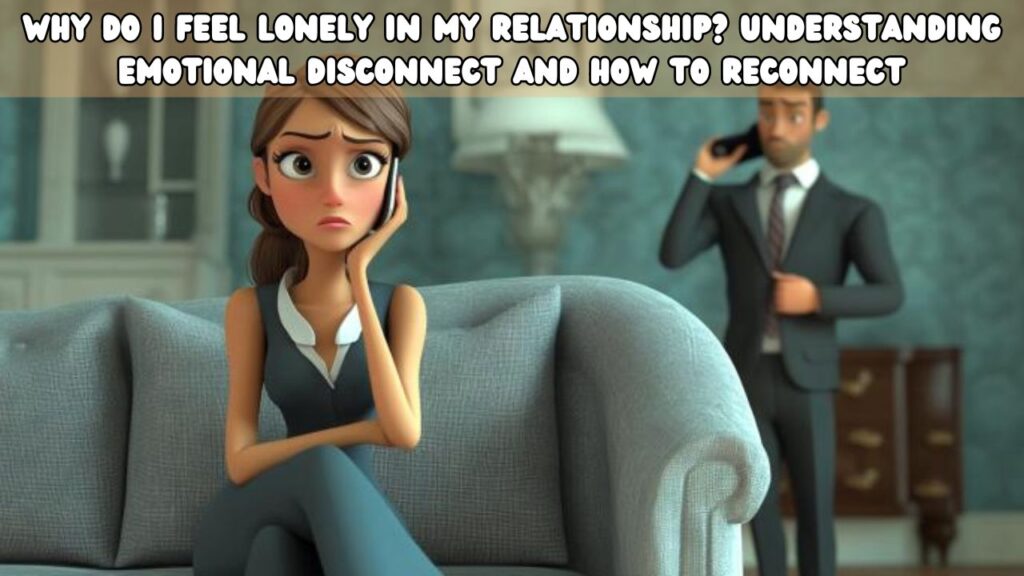Message to Dr. Hart
From: Olivia
Age: 33
Partner: 39
Duration: 6 years
From: Canada
Hi Dr. Hart,
My name is Olivia, and I’m 33 years old. My partner, Ethan, is 39, and we’ve been together for six years. We live in Canada. Lately, I’ve been feeling very lonely in our relationship, even though we spend time together and nothing significant has changed on the surface. I love him, and we don’t argue much, but I still feel disconnected, like something’s missing. Why do I feel lonely when I’m with him, and what can I do to fix this?
Thank you for your help,
Olivia
Dr. Seraphina Hart’s Response:
Dear Olivia,
First of all, thank you for reaching out and sharing your experience. Feeling lonely in a relationship, especially when you deeply care about your partner and don’t experience frequent conflict, can be confusing and distressing. It’s a kind of loneliness that feels particularly isolating because, on the surface, everything seems fine. Yet, underneath, there’s a lingering sense that something is missing.
Rest assured, you’re not alone in feeling this way. Many people find themselves grappling with similar emotions, especially in long-term relationships. Loneliness within a partnership often signals that some aspect of the emotional connection may need attention. Let’s dive deeper into the reasons why this might be happening and, more importantly, what steps you can take to address it.
Why You Might Feel Lonely in Your Relationship

Emotional Needs Aren’t Being Met
Emotional intimacy is just as important as love and compatibility, and it requires regular nurturing. Over time, the emotional landscape of a relationship can shift. Sometimes, without even realizing it, one or both partners may stop expressing their emotional needs. What once fulfilled you in the relationship may no longer be enough, or the way you and Ethan communicate may have changed.
In some cases, partners unknowingly begin to operate on autopilot. You may feel like the deeper conversations or meaningful interactions that used to happen naturally have become rare. When these emotional needs go unmet or unspoken, loneliness can quietly take root, even in relationships where love is still present. To bridge this gap, it’s essential to regularly check in with each other about what you both need emotionally.
Changes in the Relationship Dynamic
Relationships often evolve from the excitement of the early stages into a more stable, predictable routine. While this transition can provide a sense of comfort and security, it can also create an emotional distance if both partners aren’t mindful of keeping the connection alive.
As routines solidify, the spontaneous moments that once brought you closer can become less frequent. Conversations may become more practical than personal, and emotional intimacy may start to take a backseat to daily responsibilities. This is often referred to as “companionate love,” where the deep bond of companionship replaces some of the passion and intensity of earlier stages. While this is a normal part of long-term relationships, it can lead to feelings of emotional isolation if the connection isn’t consciously nurtured.
Stress, Work, and External Pressures
Life outside of the relationship plays a significant role in how connected we feel with our partners. Work stress, family obligations, financial concerns, or health issues can all sap emotional energy, leaving less room for intimate connection at home. Ethan might be focused on work pressures, or perhaps you’re dealing with your own challenges that make it difficult for either of you to be fully present.
When one or both partners are overwhelmed by external stressors, it’s easy to become emotionally unavailable to each other without even realizing it. Even when you’re physically together, your minds may be elsewhere, and this can result in feeling disconnected and alone, despite sharing the same space.
Different Communication Styles
How we communicate love and affection plays a critical role in how emotionally fulfilled we feel in a relationship. You and Ethan might express your emotions in different ways, and if those love languages aren’t aligned, one or both of you may feel emotionally unsatisfied.
For instance, Ethan might express his love through actions—by doing practical things like helping with daily tasks or offering support. Meanwhile, you might need verbal affirmations, deeper conversations, or emotional vulnerability to feel connected. When there’s a mismatch between how each of you shows and receives love, it can lead to feelings of loneliness, even though you both care deeply for each other. Understanding each other’s love language and learning to meet each other halfway can make a significant difference.
Unspoken Resentments or Unresolved Issues
Even in relationships with minimal conflict, underlying frustrations can exist. Sometimes, the absence of open confrontation can lead to the buildup of small, unspoken resentments. These might stem from unmet expectations, small annoyances, or unresolved emotional wounds from past interactions.
If these issues are never addressed, they can slowly create a barrier between you and Ethan. You may not realize it, but these subtle feelings of frustration or hurt might be contributing to your sense of emotional distance. Over time, these unresolved issues can chip away at intimacy, leaving you feeling lonely, even if the problems don’t seem significant enough to confront outright.
Growing in Different Directions
It’s natural for both partners to grow and evolve as individuals over the course of a relationship. However, if your personal growth isn’t aligned, it can create a subtle divide. As you and Ethan mature and develop new interests, goals, or values, you might find that your emotional connection isn’t as strong as it once was.
For example, if one of you is pursuing personal or professional growth that the other doesn’t fully understand or support, it can create feelings of isolation. This doesn’t necessarily mean you’re growing apart irreparably, but it may indicate that you both need to recalibrate your relationship to ensure you’re still connected on an emotional and intellectual level.
Steps to Reconnect with Your Partner

Feeling lonely in your relationship doesn’t have to signal its end. Instead, it can serve as a wake-up call to examine the emotional dynamics at play and to take proactive steps toward healing and reconnection. Emotional intimacy, like all aspects of a relationship, requires ongoing effort, communication, and understanding. The good news is, there are several practical steps you can take to address this emotional distance and reignite the connection between you and Ethan. Let’s explore some strategies that can help.
Open Up a Safe and Honest Conversation
The foundation for emotional reconnection is open, honest communication. Before diving into solutions, it’s crucial to express how you’ve been feeling. Approach the conversation with empathy and curiosity rather than blame or frustration. Remember, Ethan may not even be aware that you’re feeling disconnected, and how you introduce the topic will shape his response.
Start by using “I” statements to avoid putting him on the defensive. For example, instead of saying, “You’re making me feel lonely,” try framing it as, “I’ve been feeling lonely lately, and I’d love for us to talk about why that might be.” This approach ensures that Ethan understands your perspective without feeling attacked, which opens the door for a more constructive dialogue. A calm, compassionate conversation will encourage both of you to share your emotions openly and work together toward finding solutions.
Identify and Clearly Express Your Emotional Needs
Understanding what’s missing in your emotional connection is essential to improving it. Take time to reflect on your specific needs. What are the areas where you feel unfulfilled? Is it a lack of deeper conversations, less physical affection, or fewer moments of quality time? Sometimes, these unmet needs are subtle but can have a profound impact on how connected we feel.
Once you’ve identified your emotional needs, communicate them clearly and kindly to Ethan. He may not realize that certain aspects of the relationship are lacking for you, or he might express love in ways that don’t fully resonate with what you need. By articulating your needs openly—without fear of judgment—you empower both of you to focus on reconnecting in meaningful ways. It’s not about criticizing what Ethan isn’t doing but rather letting him in on what helps you feel emotionally supported.
Reconnect Through Shared Experiences
Emotional intimacy can be reignited through shared experiences that bring you closer together. When couples fall into a routine, they often lose the spontaneous, engaging activities that once deepened their bond. To rebuild this sense of closeness, consider incorporating new and meaningful activities into your relationship.
You don’t have to plan elaborate vacations or grand gestures; even small, consistent efforts can make a significant difference. For instance, plan a weekend getaway, take a cooking class together, or simply set aside regular time for date nights that encourage deeper conversations. Engaging in new activities as a couple provides opportunities to create fresh memories, rediscover joy, and renew the sense of partnership. These shared moments can help you both feel more connected emotionally and remind you of the love that brought you together in the first place.
Explore Your Own Emotional Landscape
Before solely focusing on the relationship, take time to explore your own emotional state. Sometimes, feelings of loneliness can stem from within, rather than from the relationship itself. Reflect on other areas of your life—your work, friendships, or family dynamics. Are you feeling disconnected or unsupported in these aspects?
Loneliness in a relationship can sometimes be influenced by personal feelings of isolation or stress in other areas. Self-reflection and, if needed, individual therapy can help you gain clarity on whether part of your loneliness is related to internal factors. By addressing these personal emotions, you can gain a clearer understanding of how much is truly tied to the relationship and how much is related to your overall emotional well-being.
Reintroduce Physical Affection and Touch
Physical affection often plays a vital role in emotional closeness. When physical intimacy diminishes, emotional distance can quickly follow. This doesn’t just refer to sexual intimacy but also the everyday moments of touch that foster connection, such as holding hands, hugging, or sitting close together.
If you’ve noticed that physical affection between you and Ethan has waned, consider reintroducing these small but significant gestures. Something as simple as a spontaneous hug, touching his arm while you talk, or cuddling while watching a movie can have a profound effect on your emotional bond. These moments of physical closeness help reaffirm your connection and remind both of you that love is still present, even in the smallest acts.
Seek Professional Support if Needed
If, after making these efforts, you still find it challenging to bridge the emotional gap, seeking professional help can be incredibly beneficial. Couples therapy isn’t just for relationships in crisis—it’s also a proactive step for couples who want to deepen their connection and better understand each other’s emotional needs.
A therapist can guide you both in uncovering any underlying issues that may be contributing to the emotional distance. They can help facilitate healthier communication and provide tools to navigate the complexities of emotional intimacy. Sometimes, an objective third party can offer insights and strategies that you might not discover on your own, enabling both of you to work through unresolved feelings or patterns in a safe and supportive environment.
Dr. Seraphina Hart, PhD, is a relationship therapist with over two decades of experience in the field of psychology and human behavior. With a rich academic background from Stanford University, she has an in-depth understanding of the complexities of interpersonal relationships. Dr. Hart's journey began with a deep fascination with the human mind and how it forms emotional connections, leading her to specialize in relationship therapy.
Her compassionate approach and unique methodology are informed by her extensive study of various therapeutic modalities, including Cognitive Behavioral Therapy (CBT), Emotionally Focused Therapy (EFT), and mindfulness techniques. Dr. Hart believes in the power of empathy and understanding in healing and transforming relationships. With her guidance, clients learn to navigate their emotions, communicate effectively, and foster a deep sense of self-awareness.




You may like
How to Handle Your Partner’s Jealousy: 5 Practical Ways to Strengthen Trust and Maintain Your Freedom
Should I Marry Someone with Debt? Navigating Love, Money, and Future Together
Dealing with an Overbearing Mother-in-Law: How to Set Boundaries Without Harming Your Marriage